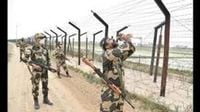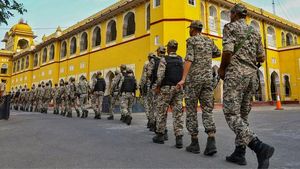The Amritsar district administration has initiated a blackout process once again, urging residents to stay indoors as a precautionary measure. This action comes shortly after a nationwide civil defence mock drill, known as 'Operation Abhyaas', was conducted to assess security preparedness amid rising tensions between India and Pakistan.
In a statement released by the district public relations officer (DPRO), the blackout was described as being implemented out of ‘utmost caution’. Residents were advised to remain calm and stay inside their homes, with explicit instructions to keep outside lights switched off. "Taking utmost caution, the Amritsar district administration has again started the blackout process. Please stay at home, do not panic, and do not gather outside your houses; keep the outside lights switched off," the statement said, as reported by ANI.
The decision to resume the blackout was made just hours after mock drills simulating various emergency scenarios, including air raids and fire emergencies, were held across several states and Union Territories as part of the drill. The Ministry of Home Affairs (MHA) announced the mock drills on May 5, 2025, following a deadly terror attack in Pahalgam that claimed the lives of 26 civilians. The Indian military subsequently launched 'Operation Sindoor', targeting terror infrastructure in Pakistan and Pakistan-occupied Kashmir (PoK) as a response to the attack.
Close to 300 'civil defence districts' across the country, which included sensitive installations such as nuclear plants and military bases, participated in the drills. In Punjab, mock exercises were executed in various districts, including Ferozepur, Ludhiana, Amritsar, and others, to evaluate the readiness of civil defence services and the effectiveness of evacuation plans. These drills aimed to train civilians on how to react during hostile attacks and ensure the early camouflage of vital installations.
As tensions have escalated, residents in some border villages of Punjab have begun relocating to safer areas, despite the absence of official evacuation orders from governmental agencies. Villagers in Ferozepur district have started moving their belongings, with Deputy Commissioner Deepshikha Sharma assuring that there is currently no reason for panic.
Villages such as Tendi Wala, Kalu Wala, and Gatti Rajo Ke have seen residents preparing to leave. Kakku Singh, a 63-year-old from Babmha Haji village, expressed concern for his daughters who live in a village near the border, stating he wants them to move to his village until the situation stabilizes. Pachho Bai, a 58-year-old from Tendi Wala, echoed similar sentiments, citing worries about her home being just 2 km from the International Border (IB). "We are six members in the family. My husband and my son are away at work but we are planning to move soon to the house of a relative," she shared.
Additionally, panic buying has surged in Amritsar and Batala districts, with residents stocking up on essential grocery items like pulses, cooking oil, and flour. The recent airstrikes under 'Operation Sindoor' targeted nine terror hideouts in Pakistan, including strongholds of the Jaish-e-Mohammad and Lashkar-e-Taiba, in a direct response to the Pahalgam attack.
Former Punjab Chief Minister and BJP leader Amarinder Singh praised the Indian military's actions, stating, "The country had made it categorically clear that it will not let those responsible for the Pahalgam terror attack go unpunished. They have been punished as has been admitted by the Jaish-e-Mohammad terrorist, who though escaped himself, lost several members of his family."
The ongoing tensions have also severely impacted tourism in Amritsar, particularly at the Golden Temple, which has witnessed a staggering 70 percent drop in footfall. Typically, the temple attracts between 100,000 to 125,000 visitors daily, but the current climate has led to a significant decline. Over 80 percent of bookings in SGPC-run sarais (inns) have been cancelled as outstation devotees cut their visits short in light of recent events.
Gurpreet Singh, manager of an SGPC-run sarai, reported that they have been inundated with cancellation requests since the airstrike, stating, "At least 70 percent of our occupancy in sarais was affected." Surinder Singh, president of the Federation of Hotel and Guest Houses (Walled City), noted that Amritsar’s tourism sector is particularly susceptible to disruptions caused by geopolitical tensions. He remarked that it took him just 15 minutes to access the sanctum sanctorum of the Golden Temple, a stark contrast to the usual wait of over two hours.
APS Chatha, president of the Amritsar Hotel and Restaurant Association, reported that hotel occupancy had plummeted to just 10 percent by evening, with most guests being on official tours or attending family events. He predicted that the adverse effects on tourism would likely persist for the next two to three months, given the current state of affairs.
As the situation continues to evolve, authorities and residents alike are bracing for further developments, with the potential for more civil defence measures and community responses to the ongoing tensions between India and Pakistan.




